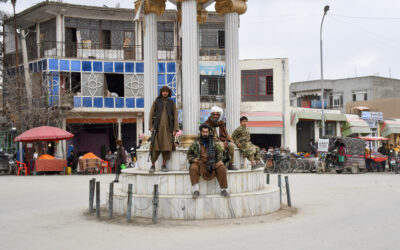
The Long Arm of China’s Security Services
SUBSCRIBER+ EXCLUSIVE REPORTING — When Chinese President Xi Jinping came to San Francisco last November to meet with President Joe Biden, Chinese pro-democracy activists in […] More
“Our foreign policy is a complete and total disaster. No vision. No purpose. No direction. No strategy.”
Then-presidential-candidate Donald Trump said that in his first foreign policy speech in April 2016, when he was attacking President Barack Obama’s track record. Candidate Trump distorted the situation then, but his words certainly are more accurate today when describing the results of his own “America First” approach to the world this past year.
There are alternative, serious approaches for the U.S. to take to regain its world leadership role, some of which were voiced last Thursday during a Senate Armed Services Committee hearing devoted to examining now-President Trump’s recently released National Security Strategy.
They came from three older Republican foreign policy professionals – former-Secretaries of State Henry A. Kissinger and George P. Shultz, plus former-Deputy Secretary of State Richard L. Armitage. Each presented ideas that could help reshape the Trumpian foreign policy by adding realistic vision, purpose, direction and strategy to meet today’s world.
Kissinger, as one might expect, stepped back and presented a longer view. “The world order, which after gathering momentum for nearly two decades, is trending towards the international system’s erosion rather than its consolidation,” he said. The world’s powers – the U.S., China and Russia – have separate national interests and as a result “traditional patterns of great power rivalry are returning.”
Along with extraordinary progress in technological development, “This creates new potential for truly catastrophic confrontations between nations,” Kissinger said.
“The challenge we face at this moment…is to determine what our national objectives are and how to reach them in a strategic manner,” he added.
He suggested the Trump administration has three questions to answer, questions which I cannot remember the president or his senior aides ever laying out so clearly: “What threats are so central to American security that we will resist them alone, if necessary? What threats will we deal with only with allies? What challenges do not rise to the level of military confrontation?”
Kissinger warned that “as a student of history, that, if one relies entirely on abstract military planning without having thought through the political consequences, one may find oneself in an irreversible position.”
Armitage noted the Trump National Security Strategy made its top priority “the re-emergence of long-term, strategic competition” with China and Russia, rather than terrorism.
He then criticized the Trump administration for “the difference between the administration’s words and deeds,” citing its failure to push back against China’s destabilizing activities in the South China Sea and “Russia’s efforts to undermine democracy both at home and abroad.”
Shultz looked out at the future, delivering facts that have never come out of Trump’s mouth, but should be built into designing U.S. foreign, economic, education and immigration policies.
“Birth rates are falling. Longevity is rising. In a sense, we used to think of populations as being a lot of young people, and…a few older people. Now, it’s totally reversed, with huge implications.”
Shultz noted, “The big decline’s coming in the population of China and Russia. I might say, on Russia, Russia’s economy is not as big as Italy’s, and it has twice the number of people. It shows you how poorly they’re running their economy, and their population is shrinking.”
“The places in the world that are seeing big increases in population are mostly in Africa and some parts of Asia, and these are places where there’s big explosions of populations,” he added.
Because their economies cannot support population growth, “It’s almost certain that there’s going to be a big effort for people to migrate away from those places,” Shultz said. “We’ve got to start thinking about it. You can’t ignore it.”
The U.S. could “help create conditions where people [from Africa] are less anxious to leave,” he added.
He also said that it comes to the U.S. southern border, the U.S. should not be “denouncing Mexico,” but rather recognizing that NAFTA was more than a trade treaty but a pact that “gave you the basis for talking about many, many other things – terrorism problems, environmental problems, all kinds of little issues that come along.”
Shultz pointed out that the drug gangs developed because of drug use in the U.S. “That’s where the money comes from. That’s where the guns come from. That’s where the incentive comes from,” he said.
Shultz, who also is an economist, pointed out that the economic revolution being caused by automation has resulted in rapid growth of foreign direct investment in the U.S., beginning three years ago. “Robotic 3D printing and artificial intelligence are driving manufacturers to reconsider not only how and what they make, but where they make it,” he said.
The U.S. has already been a main beneficiary, according to Shultz, although it has not been recognized by the public.
In effect, at the same time Trump has been claiming he would stop American factories from leaving the country, the situation on the ground had already been changing. “New technologies are bringing manufacturing back to the United States,” Shultz told the senators.
In 2016, foreign direct investment in the U.S. was $391 billion, 70 percent of which went to manufacturing. That investment inflow was $192 billion more than outflow of U.S. capital.
“With the cost of labor no longer a significant advantage, it makes little sense to manufacture components in Southeast Asia, assemble them in China, and then ship them to the rest of the world, when the same item can either be manufactured by robots or printed where it will be used,” he said.
The U.S. lost some eight million manufacturing jobs from 1998 to 2009, but regained only about a million of them through 2015, Shultz said. Collaborative robots will “assist human workers, and thus dramatically increase human productivity,” in the future, he added. Retraining older workers and educating new ones with future-needed skills will be a new government challenge.
Shultz said these new technologies “will inevitably change warfare, too.”
He predicted “nano-explosives four to 10 times the power of TNT” would be carried on inexpensive drones “producing a revolution of small, smart and cheap weapons that will redefine the battlefield.”
Shultz criticized the Trump National Security Strategy because it “doesn’t adequately address the fact of the huge change that’s taking place in de-globalization and in the new kind of weaponry that’s coming about and what the implication of that are.”
On North Korea, Kissinger said he supported denuclearization of the Korean peninsula, the objective of the Clinton, Obama and Trump administrations.
He agreed with six-power negotiations to reach that goal, but raised doubts about war with North Korea. “A war at the border of China and Russia without some agreement with them,” Kissinger said, ‘that is a big decision.”
He also put it in the larger context of nonproliferation in general.
“I think the denuclearization of North Korea, which is not a direct, overwhelming threat to us, is important for the evolution of the international strategy with respect to nonproliferation,” Kissinger said, since he believes if Pyongyang were left with such weapons, South Korea and Japan would want their own and the problem of Iran was “just down the road.”
There are wise men and women outside the administration who have ideas worth considering when it comes to national security issues. Too bad that last Thursday’s Armed Services hearing did not get a wider audience.
Fine Print columnist Walter Pincus is going on leave to finish a book on nuclear weapons. He may during this time write occasional articles for The Cipher Brief.
Related Articles

SUBSCRIBER+ EXCLUSIVE REPORTING — When Chinese President Xi Jinping came to San Francisco last November to meet with President Joe Biden, Chinese pro-democracy activists in […] More

SUBSCRIBER+EXCLUSIVE EXPERT PERSPECTIVE — More than two years after its withdrawal from Afghanistan, the U.S. still does not have a clear way forward in the […] More

SUBSCRIBER+ EXCLUSIVE REPORTING — Ukrainians greeted Saturday’s long-awaited House passage of $60.8 billion in aid with justifiable jubilation. For months, their soldiers, civilians, and political […] More

SUBSCRIBER+ EXCLUSIVE REPORTING — A race for control of space is underway, and just as on earth, the U.S. and China are the top competitors. […] More

SUBSCRIBER+ EXCLUSIVE REPORTING — For nearly a week, the Middle East and much of the world were on a knife’s edge, waiting for a promised […] More

BOTTOM LINE UP FRONT – Less than one week after Iran’s attack against Israel, Israel struck Iran early on Friday, hitting a military air base […] More
Search